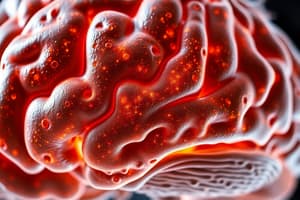Podcast
Questions and Answers
What is the primarily responsible brain region for the consolidation of long-term memories?
What is the primarily responsible brain region for the consolidation of long-term memories?
- Cerebellum
- Hippocampus (correct)
- Frontal lobe
- Occipital lobe
Which type of amnesia affects the ability to recall past events?
Which type of amnesia affects the ability to recall past events?
- Retrograde amnesia (correct)
- Dissociative amnesia
- Global amnesia
- Anterograde amnesia
What process involves creating strong representations of information in memory?
What process involves creating strong representations of information in memory?
- Consolidation (correct)
- Retrieval
- Acquisition
- Storage
Which memory type is typically processed unconsciously?
Which memory type is typically processed unconsciously?
What is the term for the phenomenon where more recent memories are more susceptible to forgetting compared to older memories?
What is the term for the phenomenon where more recent memories are more susceptible to forgetting compared to older memories?
What type of priming is associated with the memory of concept-based cues rather than explicit details?
What type of priming is associated with the memory of concept-based cues rather than explicit details?
Which part of the brain is primarily linked to declarative memory?
Which part of the brain is primarily linked to declarative memory?
What type of conditioning is associated with learned responses to external stimuli without requiring conscious effort?
What type of conditioning is associated with learned responses to external stimuli without requiring conscious effort?
In the context of memory impairment, damage to which area could result in amnesia?
In the context of memory impairment, damage to which area could result in amnesia?
How is semantic priming characterized in memory processes?
How is semantic priming characterized in memory processes?
What type of amnesia is primarily associated with impairments in episodic memory?
What type of amnesia is primarily associated with impairments in episodic memory?
What term describes the gradual increase in response to a repeated stimulus, as observed in non-associative learning?
What term describes the gradual increase in response to a repeated stimulus, as observed in non-associative learning?
How does the severity of a bilateral hippocampal lesion typically affect memory function?
How does the severity of a bilateral hippocampal lesion typically affect memory function?
Which type of priming would be less effective with a damaged medial temporal region?
Which type of priming would be less effective with a damaged medial temporal region?
Which type of memory is primarily impacted by hippocampal lesions?
Which type of memory is primarily impacted by hippocampal lesions?
Which cognitive process is primarily impacted by amnesia due to hippocampal damage?
Which cognitive process is primarily impacted by amnesia due to hippocampal damage?
What type of memory would still be retained despite a significant bilateral MTL lesion?
What type of memory would still be retained despite a significant bilateral MTL lesion?
In the context of non-associative learning, what does the term 'habituation' refer to?
In the context of non-associative learning, what does the term 'habituation' refer to?
In terms of memory types, which category does 'how to ride a bike' fall under?
In terms of memory types, which category does 'how to ride a bike' fall under?
Which statement regarding memory impairment and MTL lesions is most accurate?
Which statement regarding memory impairment and MTL lesions is most accurate?
Which of the following is primarily a characteristic of declarative memory?
Which of the following is primarily a characteristic of declarative memory?
What is the role of sensory memory in the modal model?
What is the role of sensory memory in the modal model?
Which type of sensory memory is associated with auditory stimuli?
Which type of sensory memory is associated with auditory stimuli?
In comparing sensory and short-term memory, which statement is accurate?
In comparing sensory and short-term memory, which statement is accurate?
What is the primary mechanism through which information is selected in sensory memory?
What is the primary mechanism through which information is selected in sensory memory?
What characteristic differentiates iconic memory from echoic memory?
What characteristic differentiates iconic memory from echoic memory?
Which aspect of short-term memory is characterized by its duration relative to long-term memory?
Which aspect of short-term memory is characterized by its duration relative to long-term memory?
Which is a key feature of the short-term memory storage process?
Which is a key feature of the short-term memory storage process?
How does attention influence short-term memory capacity?
How does attention influence short-term memory capacity?
What represents a limitation of short-term memory?
What represents a limitation of short-term memory?
Flashcards
Encoding
Encoding
The process of converting sensory information into a form that can be stored in memory.
Consolidation
Consolidation
The process of strengthening and stabilizing memories over time.
Retrieval
Retrieval
The ability to access and retrieve stored memories.
Retrograde Amnesia
Retrograde Amnesia
Signup and view all the flashcards
Anterograde Amnesia
Anterograde Amnesia
Signup and view all the flashcards
Semantic Memory
Semantic Memory
Signup and view all the flashcards
Episodic Memory
Episodic Memory
Signup and view all the flashcards
Procedural Memory
Procedural Memory
Signup and view all the flashcards
Medial Temporal Lobe (MTL)
Medial Temporal Lobe (MTL)
Signup and view all the flashcards
MTL Lesion
MTL Lesion
Signup and view all the flashcards
Sensory Memory
Sensory Memory
Signup and view all the flashcards
Short-Term Memory
Short-Term Memory
Signup and view all the flashcards
Iconic Memory
Iconic Memory
Signup and view all the flashcards
Echoic Memory
Echoic Memory
Signup and view all the flashcards
Attention
Attention
Signup and view all the flashcards
Modal Model of Memory
Modal Model of Memory
Signup and view all the flashcards
Selection
Selection
Signup and view all the flashcards
Working Memory
Working Memory
Signup and view all the flashcards
Long-Term Memory
Long-Term Memory
Signup and view all the flashcards
Perceptual Priming
Perceptual Priming
Signup and view all the flashcards
Conceptual Priming
Conceptual Priming
Signup and view all the flashcards
Semantic Priming
Semantic Priming
Signup and view all the flashcards
Associative Priming
Associative Priming
Signup and view all the flashcards
Prefrontal Cortex
Prefrontal Cortex
Signup and view all the flashcards
Hippocampus
Hippocampus
Signup and view all the flashcards
Declarative Memory
Declarative Memory
Signup and view all the flashcards
Nondeclarative Memory
Nondeclarative Memory
Signup and view all the flashcards
Amnesia
Amnesia
Signup and view all the flashcards
Study Notes
Memory Types
- LTM (Long-Term Memory): A type of memory that stores information for extended periods, categorized into declarative and nondeclarative.
- Declarative Memory (Explicit): Consciously accessible memory, further divided into episodic and semantic memory.
- Episodic Memory: Memory of personal experiences and events; includes details about time and context.
- Semantic Memory: Memory of facts and general knowledge; does not include personal experiences.
- Nondeclarative Memory (Implicit): Unconscious memory, encompassing procedural, perceptual, and classical conditioning.
- Procedural Memory: Memory of skills and habits; how to perform actions.
Memory Processes
- Encoding: Processing incoming information and converting it into a memory representation.
- Acquisition: The initial process of gaining information, including selection (choosing relevant data) and consolidation (strengthening memory traces).
- Storage: Maintaining and preserving encoded information.
- Retrieval: Accessing and recalling stored memory.
Memory Anatomy
- Medial Temporal Lobe (MTL): Crucial for long-term memory, including the hippocampus and surrounding structures.
- Hippocampus: Essential for spatial navigation and converting short-term memories into long-term memories.
- Amnesia: Impairment of memory, categorized into retrograde (loss of past memories) and anterograde (inability to form new memories) types.
Memory Mechanisms
- Sensory Memory: Initial, brief storage of sensory information; includes iconic (visual) and echoic (auditory) memory.
- Short-Term Memory (STM): Holds a limited amount of information temporarily; crucial for conscious processing and rehearsal.
- Working Memory: Active maintenance and manipulation of information in STM; essential for complex tasks like reasoning and problem-solving.
- Models of Working Memory (e.g., Baddeley & Hitch): Working memory models describe its components including phonological loop and visuospatial sketchpad, with a central executive for control.
- Long-Term Memory: A long-term store of information organized into networks or associations.
Priming
- Priming: A change in responses to stimuli caused by prior exposure to similar stimuli.
- Perceptual Priming: Affects perceptual recognition based on prior exposure.
- Conceptual Priming: Affects higher-level cognitive processing from prior exposure.
Consolidation
- Consolidation: The process of stabilizing and strengthening memory traces; includes both temporary and long-term consolidation.
Long-term Memory Study (Rodent Studies)
- Rodent Studies: Using animal models to investigate how memories form and are stored in the brain, often involving hippocampal roles in spatial learning.
- Encoding and Retrieval: Encoding involves transforming information into a neural code, while retrieval involves accessing that information.
- Recollection and Familiarity: Two distinct processes—recollection (conscious recollection) and familiarity (subconscious awareness of previously encountered information)—in memory.
Episodic Memory (Contextual Memory)
- Episodic Memory: Memories of particular events associated with context (time and place).
- Explicit Memory: Declarative memories that are consciously available.
- Neural Substrates: The regions of the brain involved in encoding and storing episodic memories, primarily the hippocampus and associated cortical areas.
False Memories
- False Memories: Memories that are not accurate reflections of past events.
Memory Disorders (e.g., Alzheimer's, Huntington's, Parkinson's)
- Neurological Disorders: Brain diseases like Alzheimer's and Huntington's cause various memory problems.
Studying That Suits You
Use AI to generate personalized quizzes and flashcards to suit your learning preferences.




